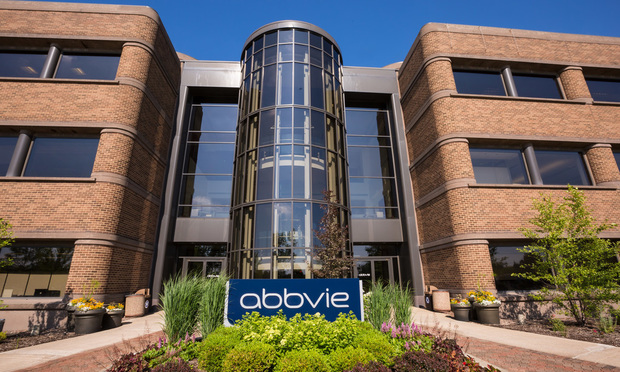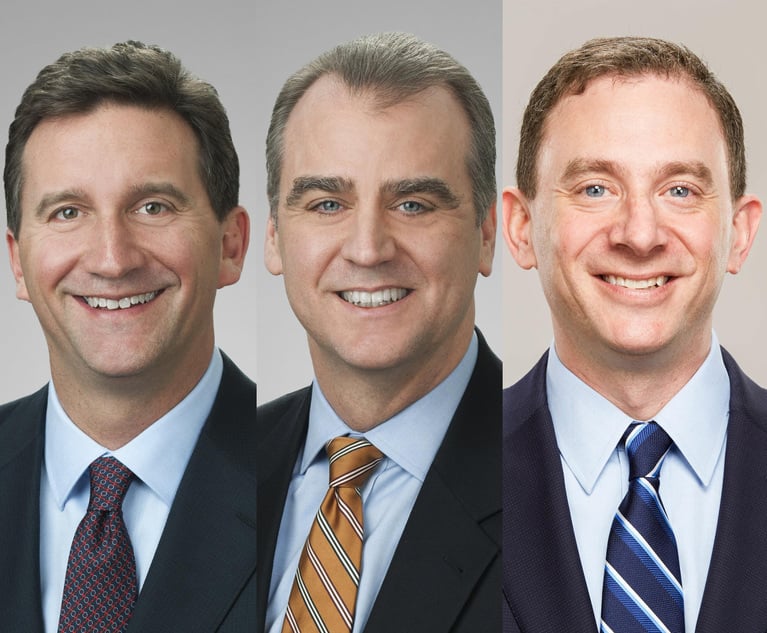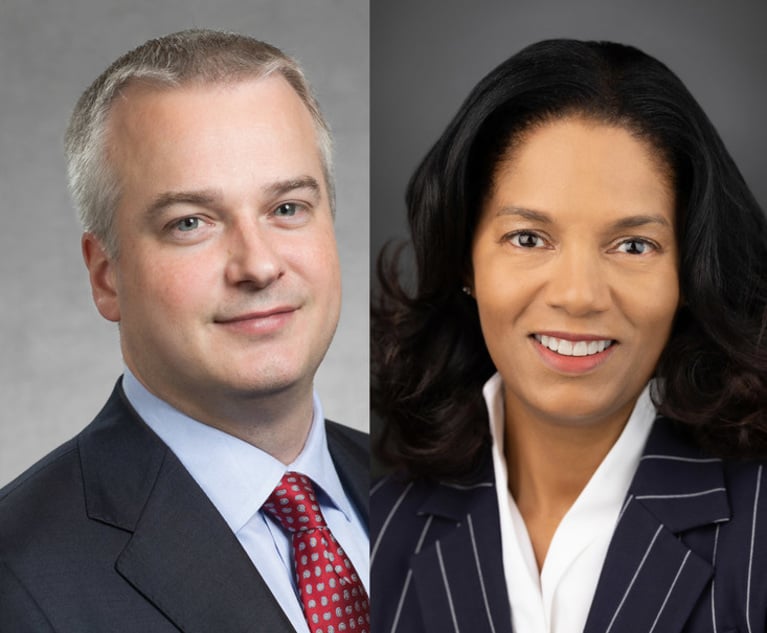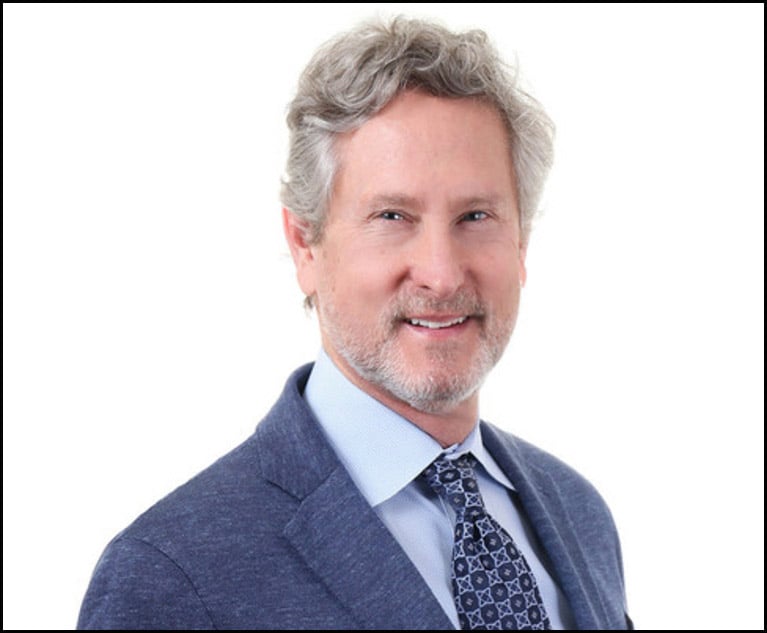AbbVie, Boehringer Settle Humira Patent Fight
Under the agreement, Boehringer will to pay AbbVie royalties for licensing its Humira patents and agreed to acknowledges the validity and enforceability of the patents, AbbVie said.
May 15, 2019 at 03:59 PM
3 minute read
The original version of this story was published on Delaware Business Court Insider
 Abbvie
Abbvie
AbbVie Inc. has settled its Delaware patent infringement suit against Boehringer Ingelheim, granting the German drugmaker a nonexclusive license to begin selling a biosimilar of its $20 billion immunosuppressant Humira in 2023.
The companies announced the settlement with a pair of press releases Tuesday. Under the agreement, Boehringer will to pay AbbVie royalties for licensing its Humira patents and agreed to acknowledge the validity and enforceability of the patents, AbbVie said.
The companies said the settlement applied only to the United States, though the specific terms of the agreement remained confidential.
“This is an important settlement as it resolves all Humira-related patent litigation in the U.S and provides access for another biosimilar manufacturer seeking to enter the U.S.,” Laura Schumacher, AbbVie's vice chairwoman of external affairs and chief legal officer, said in a statement.
“As an innovation-driven biopharmaceutical company, we will continue to develop novel cures for the toughest health challenges and rely on a robust patent system to protect that investment in innovation,” she said.
Boehringer said the license period for its biosimilar, Cyltezo, would begin July 1, 2023, making the company one of the first to market an alternative treatment option to Humira in the U.S.
“We are proud of the role we play in raising public awareness of biosimilars and being able to stimulate competition to bring more affordable treatment options to U.S. patients,” said Sheila Denton, senior vice president and U.S. general counsel at Boehringer. ”This resolution provides clarity regarding the availability of Cyltezo and allows us to focus on serving patients who need to manage their chronic disease.”
The settlement brought to a close AbbVie's 2017 suit under the Biologics Price Competition and Innovation Act, a federal law that provides for expedited regulatory approval of drugs that are exceptionally similar to innovative products already being sold in the U.S. The Chicago-based drugmaker claimed just eight patents in its complaint, but said it could assert dozens more if Boehringer, which had received regulatory approval, attempted to launch its copycat.
Boehringer responded with its own “unclean hands” defense, claiming that AbbVie had engaged in a “global effort” of pursuing overlapping and noninventive patents in order to create a “patent thicket” that would delay competition for its blockbuster drug. In February, U.S. Magistrate Judge Richard A. Lloret ordered AbbVie after a delay to quickly produce documents related to Boehringer's defense.
On Tuesday, AbbVie entered a stipulation of dismissal with the court, saying that all claims and defenses had been dismissed without prejudice and that each side would bear its own costs.
According to filings with the U.S. Securities and Exchange Commission, Humira accounted for 65% of AbbVie's total net revenues in 2017 and generated more than $18 billion in global sales, up 14.6% from 2016.
AbbVie was represented by William F. Lee, William G. McElwain and Amy K. Wigmore of Wilmer Cutler Pickering Hale and Dorr and Michael P. Kelly and Daniel M. Silver of McCarter & English.
Boehringer was represented by Bruce M. Wexler, Eric W. Dittmann, Isaac S. Ashkenazi, Chad Peterman, Young Park, Ashley Mays-Williams, Nicholas Tymoczko and Carl Minniti of Paul Hastings and James D. Taylor Jr., Selena E. Molina, Christopher R. Hall and Andrea P. Brockway of Saul Ewing Arnstein & Lehr.
The case was captioned AbbVie v. Boehringer Ingelheim Pharmaceuticals.
This content has been archived. It is available through our partners, LexisNexis® and Bloomberg Law.
To view this content, please continue to their sites.
Not a Lexis Subscriber?
Subscribe Now
Not a Bloomberg Law Subscriber?
Subscribe Now
NOT FOR REPRINT
© 2025 ALM Global, LLC, All Rights Reserved. Request academic re-use from www.copyright.com. All other uses, submit a request to [email protected]. For more information visit Asset & Logo Licensing.
You Might Like
View All
Litigators of the (Past) Week: Defending Against a $290M Claim and Scoring a $116M Win in Drug Patent Fight

Litigators of the Week: A Trade Secret Win at the ITC for Viking Over Promising Potential Liver Drug

Litigation Leaders: Mark Jones of Nelson Mullins on Helping Clients Assemble ‘Dream Teams’

Litigators of the Week: An Early Knockout Win in the Decongestant MDL
Trending Stories
- 1States Accuse Trump of Thwarting Court's Funding Restoration Order
- 2Microsoft Becomes Latest Tech Company to Face Claims of Stealing Marketing Commissions From Influencers
- 3Coral Gables Attorney Busted for Stalking Lawyer
- 4Trump's DOJ Delays Releasing Jan. 6 FBI Agents List Under Consent Order
- 5Securities Report Says That 2024 Settlements Passed a Total of $5.2B
Who Got The Work
J. Brugh Lower of Gibbons has entered an appearance for industrial equipment supplier Devco Corporation in a pending trademark infringement lawsuit. The suit, accusing the defendant of selling knock-off Graco products, was filed Dec. 18 in New Jersey District Court by Rivkin Radler on behalf of Graco Inc. and Graco Minnesota. The case, assigned to U.S. District Judge Zahid N. Quraishi, is 3:24-cv-11294, Graco Inc. et al v. Devco Corporation.
Who Got The Work
Rebecca Maller-Stein and Kent A. Yalowitz of Arnold & Porter Kaye Scholer have entered their appearances for Hanaco Venture Capital and its executives, Lior Prosor and David Frankel, in a pending securities lawsuit. The action, filed on Dec. 24 in New York Southern District Court by Zell, Aron & Co. on behalf of Goldeneye Advisors, accuses the defendants of negligently and fraudulently managing the plaintiff's $1 million investment. The case, assigned to U.S. District Judge Vernon S. Broderick, is 1:24-cv-09918, Goldeneye Advisors, LLC v. Hanaco Venture Capital, Ltd. et al.
Who Got The Work
Attorneys from A&O Shearman has stepped in as defense counsel for Toronto-Dominion Bank and other defendants in a pending securities class action. The suit, filed Dec. 11 in New York Southern District Court by Bleichmar Fonti & Auld, accuses the defendants of concealing the bank's 'pervasive' deficiencies in regards to its compliance with the Bank Secrecy Act and the quality of its anti-money laundering controls. The case, assigned to U.S. District Judge Arun Subramanian, is 1:24-cv-09445, Gonzalez v. The Toronto-Dominion Bank et al.
Who Got The Work
Crown Castle International, a Pennsylvania company providing shared communications infrastructure, has turned to Luke D. Wolf of Gordon Rees Scully Mansukhani to fend off a pending breach-of-contract lawsuit. The court action, filed Nov. 25 in Michigan Eastern District Court by Hooper Hathaway PC on behalf of The Town Residences LLC, accuses Crown Castle of failing to transfer approximately $30,000 in utility payments from T-Mobile in breach of a roof-top lease and assignment agreement. The case, assigned to U.S. District Judge Susan K. Declercq, is 2:24-cv-13131, The Town Residences LLC v. T-Mobile US, Inc. et al.
Who Got The Work
Wilfred P. Coronato and Daniel M. Schwartz of McCarter & English have stepped in as defense counsel to Electrolux Home Products Inc. in a pending product liability lawsuit. The court action, filed Nov. 26 in New York Eastern District Court by Poulos Lopiccolo PC and Nagel Rice LLP on behalf of David Stern, alleges that the defendant's refrigerators’ drawers and shelving repeatedly break and fall apart within months after purchase. The case, assigned to U.S. District Judge Joan M. Azrack, is 2:24-cv-08204, Stern v. Electrolux Home Products, Inc.
Featured Firms
Law Offices of Gary Martin Hays & Associates, P.C.
(470) 294-1674
Law Offices of Mark E. Salomone
(857) 444-6468
Smith & Hassler
(713) 739-1250






